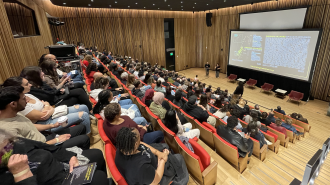The future is bright for the Arabic audiobooks industry
Deloitte has predicted that in 2020, the global audiobook market will grow by 25 percent to $3.5 billion.
The trend is also apparent in the MENA region as it celebrates Arabic Language Day on 18 December. Audiobooks are gaining in popularity in the Arab World.
Recognising this growth, Swedish audiobook streaming service, Storytel, has recently acquired UAE-based audiobook Kitab Sawti. Both platforms will combine their catalogues to form one of the world's biggest Arabic audiobook libraries offering 5,000+ audiobooks in Arabic.
"We are very positive," Sebastian Bond, CEO, and Founder of Kitab Sawti told The New Arab. "We strongly believe that audiobooks have a huge potential in the region as people spend a lot of time these days on the phone or in the car."
He added saying: "Audiobooks are getting more and more attraction in the US and Europe, and the Middle East has all the basic components in place for an audiobook market." According to Deloitte, there are more than 500 million audiobook consumers around the world.
 |
As the world hunkers down to combat a deadly pandemic, interest in books, and especially audiobooks, has increased |  |
Kitab Sawti, which was founded in 2016 by Swedish entrepreneurs Sebastian Bond and Anton Pollakis, is one of the leading producers of audiobook streaming services for Arabic content, operating a network of studios across the Arabic region.
Kitab Sawti achieved an annual sales growth of 79 percent in the first quarter of 2020. It has a catalogue of 2,500+ audiobook titles covering more than 80 percent of the regional best-sellers, including Celestial Bodies by Jokha Alharthi and The Bamboo Stalk by Saud Al Sanousi.
 |
|
| Read more: Muslim women writers who are changing the narrative one book at a time |
Storytel has a total of 1.2 million paying subscribers and operations in 20 markets, with more than 500,000 audiobooks and e-books in their library. According to Reuters, the Swedish company has been witnessing spikes, with an increase of 101,800 paying customers in Q2 2020.
When asked if he is worried about the competition, like Audible coming into the region to sweep the market, Bond said: "No. We have been in the market for many years. We have a very good relationship with publishers and customers, and we know what they want."
"It's not possible for anyone to sweep the market. The Middle East is a huge market, so competition is not bad, so it might be good. We can build the market together."
Amazon's Audible captures 27.8 percent of the global audiobook market, while Amazon has 16.73 percent of the market. That's almost 45 percent of the worldwide audiobook market controlled by one company.
When asked about their process of finding narrators, Bond said they have a team working to find and train the best people. They currently work with over 100 narrators.
Asked about his journey in the field of Arabic audiobook production, Bond said that while working in the same area in Sweden he identified the need for Arabic audiobooks, mostly educational audiobooks.
 |
We saw a demand for Arabic audiobooks in the region. We realised that Arabic audiobooks don't exist |  |
"Arabic is the second mother tongue in Sweden. We saw a demand for Arabic audiobooks in the region. We realised that Arabic audiobooks don't exist."
Jordanian best-selling author Fadi Zaghmout had two of his novels made into audiobooks. "The process was simple; I only had to sign with Storytel as I had the audio rights for these books. They sent me a sample for the narrator before they completed the book, and that was it from my side," Zaghmout told The New Arab.
 |
|
| Read more from The New Arab's selection of books by Arab authors and novels about the Middle East |
Zaghmout also acknowledged the challenges facing the MENA market. "I am not sure how many players are there in the audiobook market. It is a new market, but I am afraid it will also face the usual challenges books face in the region," he said.
"It is not only the readership numbers but also competition from paperback and digital versions of the book and the whole entertainment segment available on the internet. It is a matter of taste, but it also depends on the experience audiobooks can deliver."
According to the Arab Reading Index in 2016, adults in MENA read 17 books a year, lower than their counterparts in emerging markets.
"In the last three years, there have been a lot of audiobooks," Sinan Sweis, Founder, and Director of Jabal Amman Publishers, told The New Arab. "The region is going from print towards audiobooks without going through e-books."
"The Arabic world is changing and growing," added Sweis. "There are a lot of traffic jams due to the lack of urban planning, so people are spending more time in cars, hence the need for audiobooks."
Sweis is optimistic about the future of audiobooks. "Audiobooks will take a big share from print versions in the coming five years."
Follow her on Twitter: @NatashaTynes





 Follow the Middle East's top stories in English at The New Arab on Google News
Follow the Middle East's top stories in English at The New Arab on Google News


